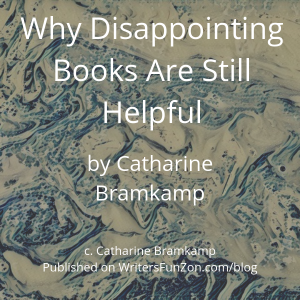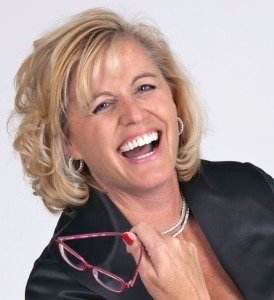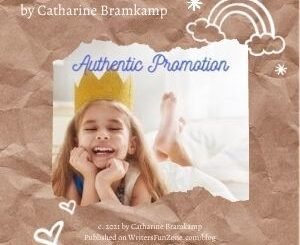Why Disappointing Books Are Still Helpful by Catharine Bramkamp
 Let’s welcome back monthly columnist Catharine Bramkamp as she shares with us: “Why Disappointing Books Are Still Helpful.” Enjoy!
Let’s welcome back monthly columnist Catharine Bramkamp as she shares with us: “Why Disappointing Books Are Still Helpful.” Enjoy!
***
Disappointing Books
I was intrigued by the promise of a newly released book on starting a new career at sixty. But I was disappointed.
I assumed the book would illuminate the steps a person takes to start over. I wanted to read about the many unexpected roadblocks and hairpin turns. I read to discover how this writer re-created herself to become a new thing, in this case, an artist. I read to confirm that with age comes perspective and a deep understanding of what is important and what is not. In a word, it’s not over, you can do anything, no matter your age.
The unnamed book’s premise was that being an older person and starting something new would be problematic.
Not so much.
I think the author was surprised by this. She enrolled into an undergraduate art program, filled with Millennials and Digital Natives who do not give a damn what you are (gender fluid as a particularly interesting example). They do not care what you do (work in McDonald’s by day, performance artist by night). They care who you are, your essence, dreams, ethics.
I discovered that a long time ago when I took my first and last art class at a local community college. I was most certainly the oldest person in the room and I was not even old at the time. But the students, younger than my children, merely treated me as another, not an other.
I was terrible at painting, really, really terrible. The other students were kind – not about me and my age, but about the fact that clearly this was not a path I should even consider. They worked mightily to let me down easy.
By page three of this book, I learned that being older does not make you special. You need to work harder than that.
What is is like to start over?
I hoped this would be an in-depth discovery of how a professional made the switch from words to visuals. How she struggled and became a new thing, an artist. How do you own your art (or voice) later in life?
That is what I was interested in learning — how did this change feel in your bones?
There was no insight like that at all in this book.
The writer is not average, which is a shame because by definition, many more of us are average and want to learn about the triumph of practiced art over being always categorized in the middle of the pack.
I want confirmation that art can elevate and transform anyone, most of us. I want the plurality of art, not a lengthy self-congratulation narrative describing the inherit uniqueness of the artist and why you, the reader, will never be as good as her, the writer and artist. That was not why I was here with this book.
The author is a PhD professor, retired from her brilliant scholarly career where she earned countless awards and accolades for her research and books. In her story, she moves easily from one academic environment to another. Interestingly, before she could do her art, she needed to earn couple of degrees in art first.
From there it was an easy hop to gallery shows. Her story (and good for her) is one of ease rather than one of soul. The message and ideas I was searching for were not evident.
What I want for clients and for readers is to discover not an easy way to reinvent, but a path, choked with weeds and expectations, but available to anyone. If you look hard enough and grab a guide, you can find the way.
Because there is a way.
How can you get from retirement, change, a lay off, to a life that contains creative projects, joy at accomplishment, love for every day and every moment creating and expanding your passion project?
That’s what I want for me, that’s what I want for others.
I did not get it in this book, which just shows that self regard is not a great way to instruct or share.
In every book, there is some good. This author is almost exclusively a product of the academic environment. Maybe this was the first time she was able to express some anger, some frustration over the signaling and tyranny embedded in the very nature of higher education.
As we all know, attend a great school, you will be great by association and that is really all you need.
No more effort
No more work is needed once you’ve been accepted into the hallowed halls of guaranteed success. But the hazing process to join this fraternity is brutal and soul numbing.
The author, a product of this belief system couldn’t just make art. She had to attend the right school, get the right feedback, be anointed. She had to earn academic accolades and confirmation before she could even THINK about making art.
It wasn’t until she stopped cowering under the learned experts and escaped to work in a co-op space filled with “just” other artists that she was finally productive and happier with her work and her process. I don’t think it was intentional, but that was the moral of her story.
Re-connecting with what you’ve always wanted to do is important.
Discovering anew old artistic impulses and acting on them is exciting and adds measurable joy to your life, no matter what your age. What you don’t need is another academic degree.
Get feedback, take local classes, take seminars, but only to improve your own work. If that instruction does not improve your work, ditch it.
You do not need that weighted, ponderous, expensive outside authority to validate what you want to do.
Buy cheap paints and start.
Dig up a half used school journal and start to write for ten minutes a day.
Experiment with what art pulls you into a zone you haven’t experienced since you were five years old.
Do that.
You don’t need my permission, you don’t need another college degree, you don’t even need another book.
***
ABOUT THE AUTHOR
 Catharine Bramkamp is the co-producer of Newbie Writers Podcast that focuses on newer writers and their concerns. She is a successful writing coach, Chief Storytelling Officer, and author of a dozen books including the Real Estate Diva Mysteries series, and The Future Girls series. She holds two degrees in English and is an adjunct university professor. After fracturing her wrist, she has figured out there is very little she is able to do with one hand tied behind her back.
Catharine Bramkamp is the co-producer of Newbie Writers Podcast that focuses on newer writers and their concerns. She is a successful writing coach, Chief Storytelling Officer, and author of a dozen books including the Real Estate Diva Mysteries series, and The Future Girls series. She holds two degrees in English and is an adjunct university professor. After fracturing her wrist, she has figured out there is very little she is able to do with one hand tied behind her back.






